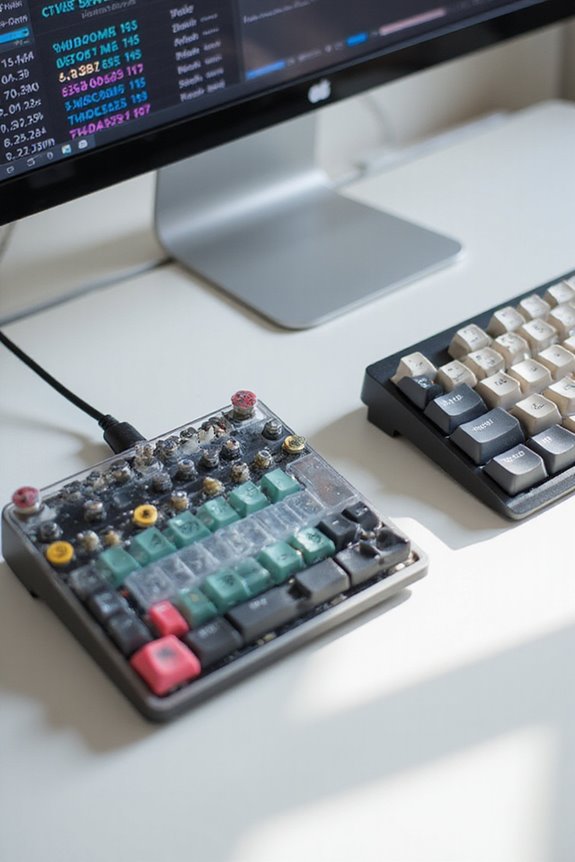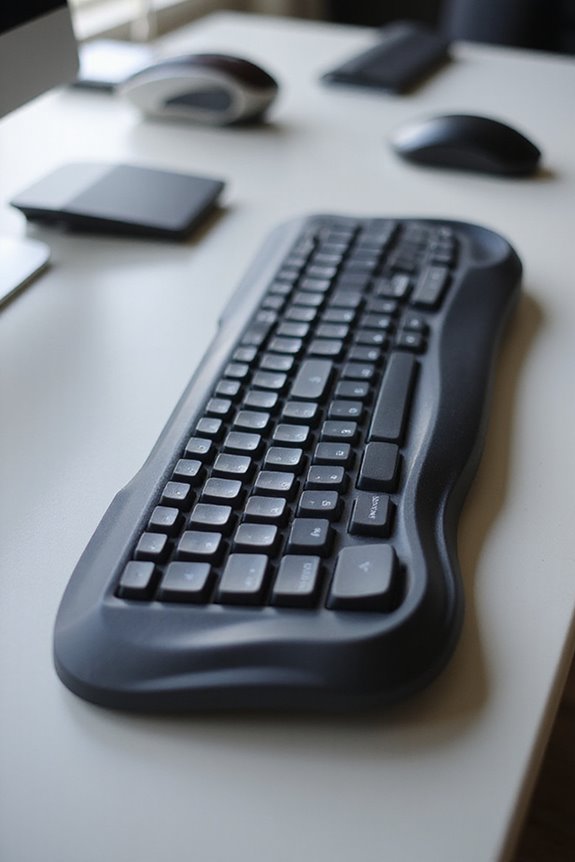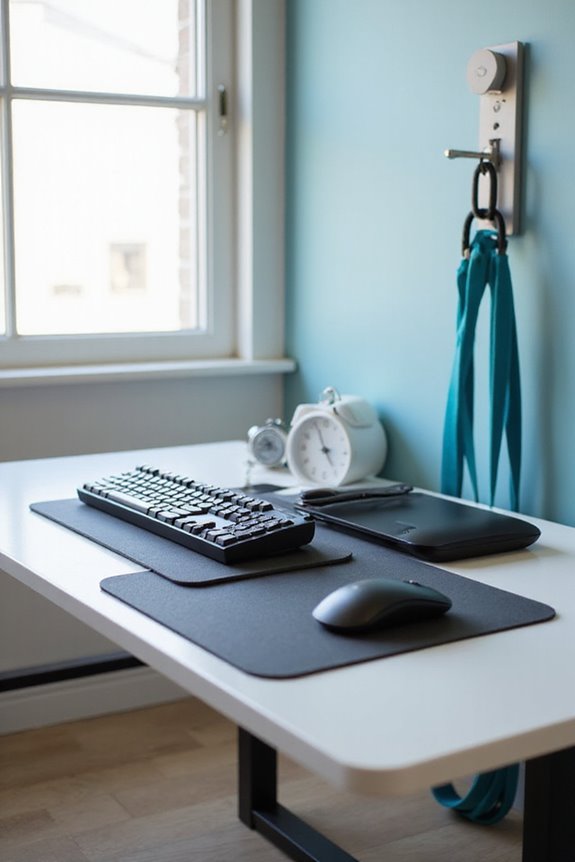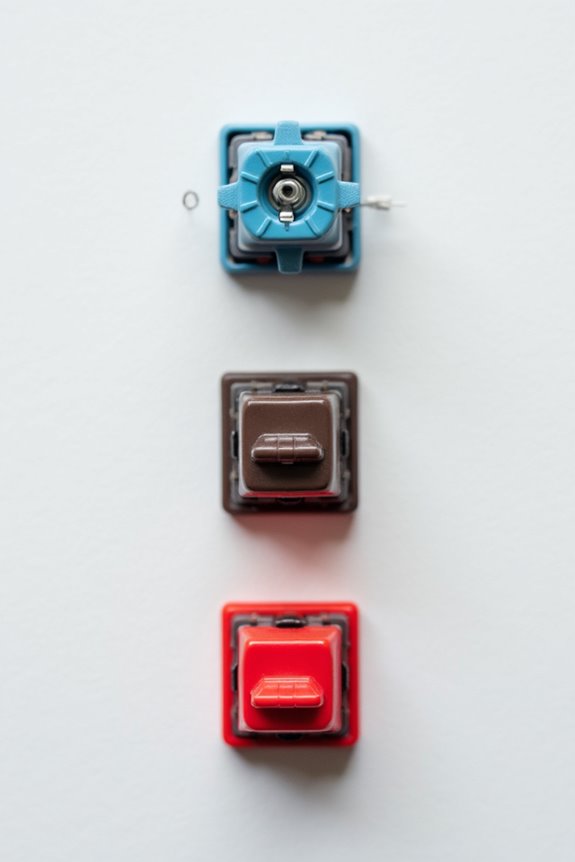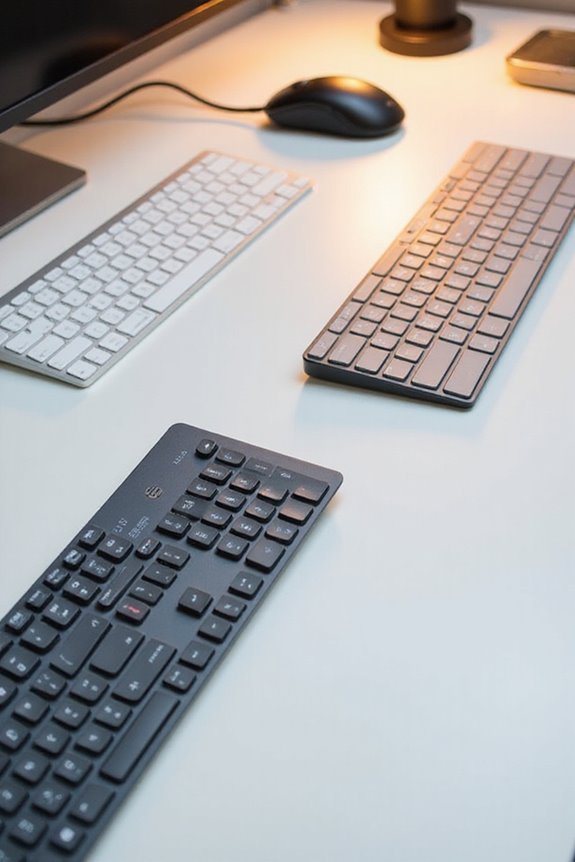Yes, I believe mechanical keyboards are better for typing. They offer 10-20% increased typing speed and improved accuracy due to tactile feedback and quicker keystroke registration. Their ergonomic features, such as customizable layouts and wrist support, enhance comfort. Additionally, the durability of mechanical switches allows for longevity, with a lifespan of 10 to 15 years. With customization options and maintenance advantages, they cater to individual preferences and needs. Explore further to discover more benefits and features.
Key Takeaways
- Mechanical keyboards enhance typing speed by 10-20% due to improved switch responsiveness and tactile feedback.
- Tactile feedback promotes rhythmic typing, reducing error rates and increasing overall typing efficiency.
- Ergonomic designs, including adjustable angles and wrist support, minimize strain during extended typing sessions.
- Customization options, such as switch types and programmable keys, allow users to tailor the keyboard to their preferences.
- Mechanical keyboards offer durability and longevity, lasting 10-15 years with proper maintenance compared to membrane keyboards.
Typing Speed and Accuracy Benefits
When considering the advantages of mechanical keyboards, it’s important to recognize how they can greatly enhance both typing speed and accuracy. One of the primary reasons lies in their typing mechanics; the tactile feedback from mechanical switches allows for a more rhythmic approach. This responsiveness helps reduce error rates, which is critical for maintaining high accuracy. Studies show that experienced typists using mechanical keyboards typically achieve 10-20% faster speeds compared to those using membrane keyboards. The improved switch responsiveness means each keystroke registers quicker, which is essential for professionals aiming for WPM rates exceeding 75. With features like n-key rollover, these keyboards support simultaneous key presses, further bolstering typing efficiency without interruption. Additionally, mechanical switches can last up to 50 million keystrokes, ensuring long-lasting performance for avid typists.
Ergonomics and Comfort Features
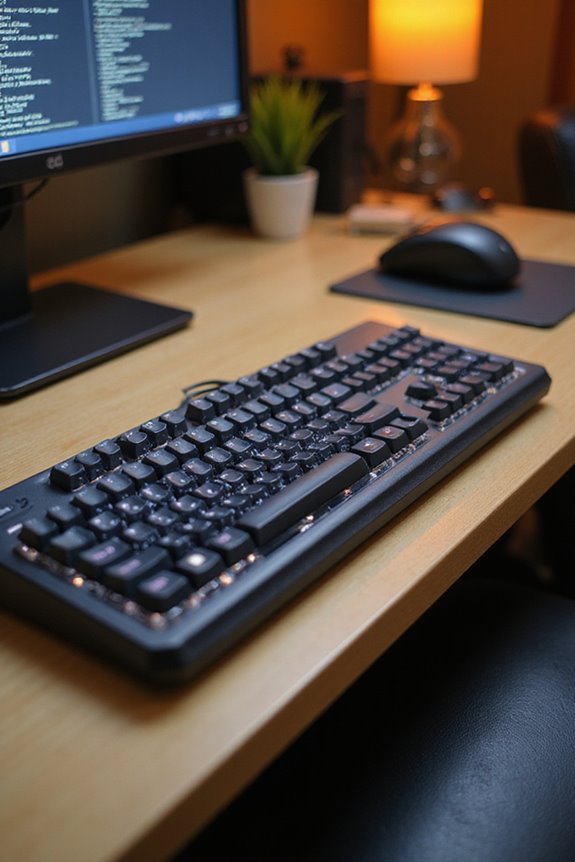
Enhanced typing speed and accuracy are just part of what makes mechanical keyboards appealing. Their ergonomics and comfort features greatly enhance the typing experience. Various key layouts, such as split and curved designs, align with natural hand movements, reducing finger strain. These layouts can be customized to fit individual hand sizes and typing styles, ensuring maximum comfort.
Additionally, adjustable angles and wrist support are essential. Tenting features help reduce wrist pronation, while integrated wrist rests maintain neutral wrist alignment. Low-profile keycaps and durable materials contribute to less finger travel, decreasing fatigue during extended use. Together, these ergonomic designs and support elements not only promote comfort but also help prevent repetitive strain injuries, making mechanical keyboards a solid choice for prolonged typing sessions.
User Satisfaction and Experience
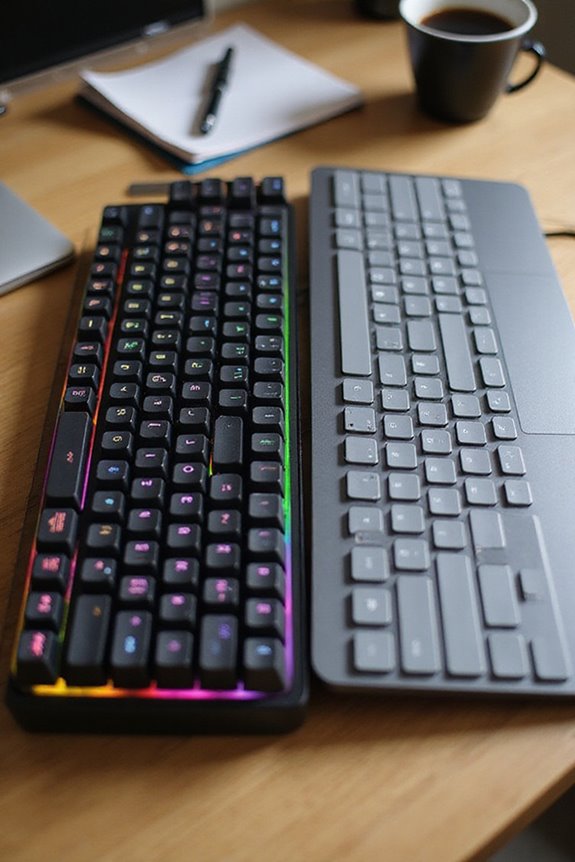
As I explore the world of mechanical keyboards, it’s clear that user satisfaction plays an essential role in their growing popularity. Many users appreciate the tactile feedback these keyboards provide, which enhances typing accuracy and efficiency. Studies show that users rate keyboards based on attributes like size, layout, and, importantly, the feel of the keys. This focus on tactile feedback leads to a generally positive subjective experience, as users often report higher typing speeds and reduced error rates. Notably, despite a slight decline in the overall keyboard market, mechanical keyboards are gaining traction, valued at $2.02 billion in 2023. Clearly, the combination of user satisfaction and tactile feedback is driving this trend among typing enthusiasts.
Customization and Versatility Options
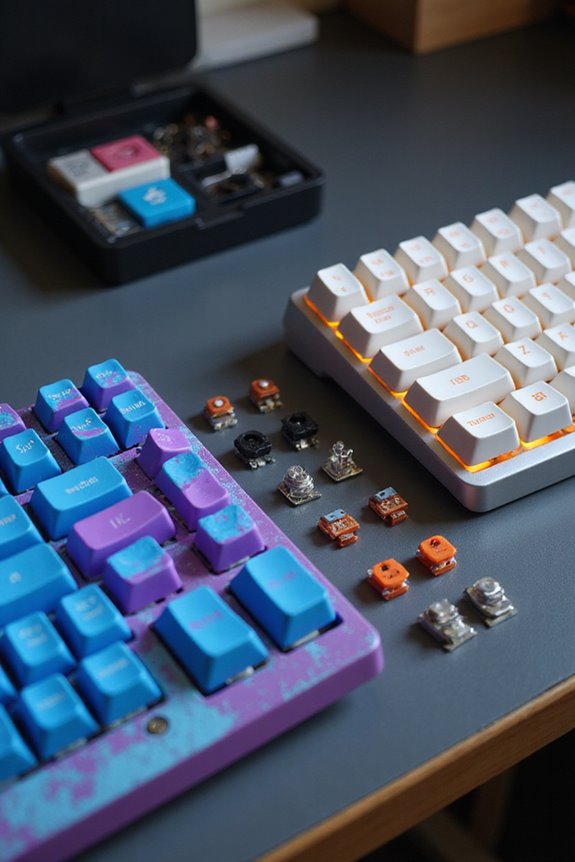
While exploring the domain of mechanical keyboards, I’ve found that the customization and versatility options available are truly remarkable. One of the most appealing features is switch customization, allowing me to select the ideal switch type based on my tactile feedback preferences. Many keyboards even offer hot-swappable switches, making this process seamless.
Additionally, I can enhance the aesthetics of my setup with aesthetic upgrades, such as unique keycap designs and customizable RGB lighting. This not only personalizes my keyboard but also reflects my style. Moreover, programmable keys allow for tailored configurations, ensuring that my keyboard meets my specific needs. Overall, these features make mechanical keyboards an excellent choice for users seeking both functionality and personalization.
Durability and Maintenance Advantages
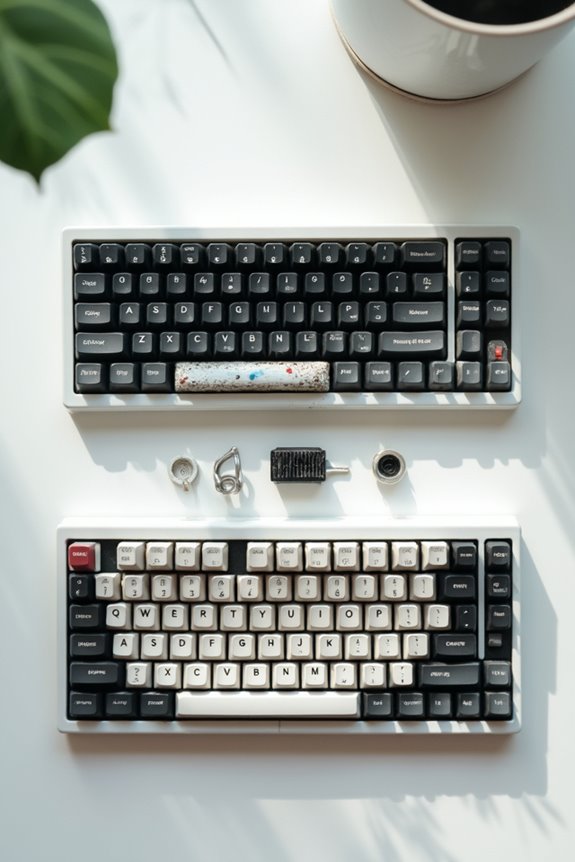
Given their robust construction, mechanical keyboards offer exceptional durability compared to other types of keyboards. With a lifespan of 10 to 15 years, they greatly outlast membrane keyboards, which often wear out much quicker. The individual mechanical switches can handle 50 to 100 million keystrokes, providing impressive durability benefits.
To guarantee your keyboard remains in excellent condition, follow these maintenance tips: regularly clean the keyboard to prevent dust accumulation, and consider lubricating the switches to enhance their smoothness. Avoid direct contact with liquids and harsh chemicals while handling your keyboard. By practicing proper maintenance, you can extend the lifespan of your mechanical keyboard and enjoy its reliability for years to come.
Error Reduction and Productivity Enhancements
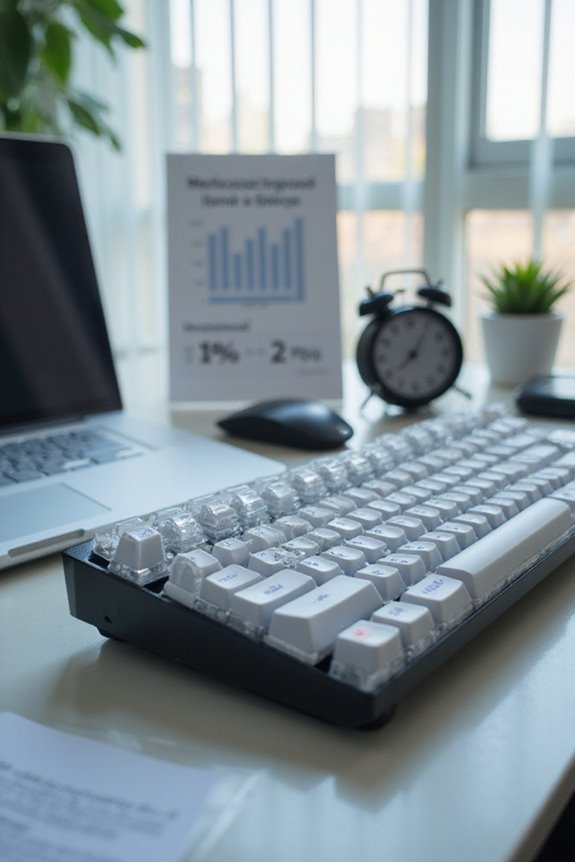
Mechanical keyboards not only excel in durability but also greatly enhance typing accuracy and productivity. Their full N-key rollover guarantees all key presses register simultaneously, minimizing missed keystrokes. This feature is particularly beneficial in fast-paced environments like coding or gaming, where error awareness is vital.
Moreover, the tactile feedback from mechanical switches aids in self-correction, allowing me to maintain my typing rhythm without needing to glance at the screen. The consistent actuation points across keys markedly reduce accidental presses, leading to fewer errors overall.
As I adapt to these keyboards, my muscle memory improves, further lowering my error rates. Ultimately, the combination of ergonomics and responsive feedback makes mechanical keyboards a solid choice for anyone looking to enhance their typing efficiency. Additionally, the customization options available for mechanical keyboards allow users to tailor their experience for even greater comfort and performance.
Frequently Asked Questions
Do Mechanical Keyboards Produce More Noise Than Traditional Keyboards?
Yes, mechanical keyboards generally produce higher noise levels than traditional keyboards. I’ve noticed that the typing experience can be quite different; the tactile feedback can be satisfying, but it may also be disruptive in quiet settings.
Can Mechanical Keyboards Be Used for Gaming?
Imagine a racecar’s engine; that’s how I feel about mechanical keyboards in gaming. Their switch responsiveness elevates my gaming performance, making each key press feel like a burst of speed, enhancing every thrilling moment of play.
Are There Any Health Risks Associated With Using Mechanical Keyboards?
Yes, there are health risks with mechanical keyboards, like wrist strain from improper posture. While their ergonomic design can help, I’ve learned that correct typing techniques and workspace setup are essential for comfort and health.
How Do Mechanical Keyboards Compare to Membrane Keyboards in Price?
Isn’t it fascinating how price can shape our choices? In my experience, mechanical keyboards are pricier due to their robust components, while membrane keyboards cater to budget considerations, making them a wise cost comparison for many users.
What Types of Mechanical Switches Are Available for Different Preferences?
When choosing mechanical switches, I’ve found three main types: linear for smoothness, tactile for feedback, and clicky for sound. Each caters to different preferences, so it’s worth trying them out to see what suits you best.

